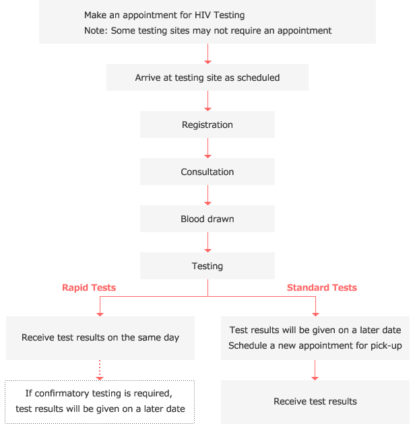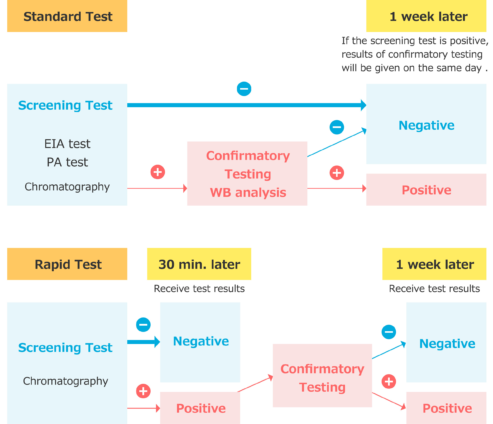HIV Testing and HIV/AIDS Counseling Map in Japan
This page provides users with the information on HIV testing and counseling in Japan.
- Consulting service
About HIV Testing
HIV Testing
HIV testing determines whether you are infected with HIV (Human Immunodeficiency Virus), the virus that can lead to AIDS (Acquired Immunodeficiency Syndrome). HIV testing is initially performed with ‘screening tests’. If the initial test result is negative, it means ‘HIV screening-test negative’. Positive screening-test results will require follow-up (‘confirmatory’) testing to establish an HIV diagnosis. If the confirmatory test is positive, it means ‘HIV infection’. If the result is negative, it means ‘HIV negative (or that the initial screening test was a false-positive)’. Screening test results can include ‘true-positives’ due to HIV infection and ‘false-positives’ due to nonspecific reactions to the tests without the presence of HIV infection. This is why confirmatory testing is required following a positive screening test to make sure that the diagnosis is correct.
Types of HIV Tests
Once HIV enters the body, it replicates itself in the body. In reaction to the replication, the immune system produces antibodies to HIV. HIV screening tests currently and commonly used in Japan called ‘combined antigen-antibody tests’ look for evidence of these HIV-1/HIV-2 antibodies and HIV-1 antigen. As mentioned earlier, positive results from screening tests require a second test to confirm the presence of HIV. There are two types of confirmatory tests: Western Blot (WB) analysis and Nucleic acid amplification (NAT) tests. WB analysis detects HIV-1/HIV-2 antibodies, and NAT tests examine HIV genes.
How long after a possible exposure should I be tested for HIV?
When a person is infected with HIV-1, it takes about 3 weeks after possible exposure for HIV-1 antigen to be detected in the blood, and about 4 weeks after possible exposure for HIV antibodies to be detected in the blood. That is to say, after 3-4 weeks of possible exposure, a person with HIV is very likely to test positive on HIV antigen-antibody tests and/or HIV antibody tests, currently used for screening testing. NAT tests used for confirmatory testing can detect HIV genes as soon as 2 weeks after exposure to the virus. Although NAT tests are effective in diagnosing early HIV infection, they may not detect the genes during the asymptomatic phase of the infection.
It is important to keep in mind that your test result can come back ‘positive’ even within 3 months of your possible exposure to HIV, and it may mean you’re infected with the virus. However your test result comes back negative, you’re encouraged to get tested again at the 3-month mark because there is a period of time after a person is infected during which they will not test positive. The length of this period may vary between individuals and getting re-tested can confirm that you are not infected with HIV.
When should I take an HIV test?
You should get an HIV test if you think you have exposed yourself to risk – for example, if you have had sex without a condom. HIV infection cannot be detected without HIV tests, and the tests can screen the possibility of your HIV infection. While it takes your body up to 3 months to produce antibodies to HIV, you can still test HIV positive in the first 4 weeks after possible exposure if you’re infected with the virus. This is why you’re encouraged to get tested whenever you’re worried at all about possible infection. HIV negative test results within 4 weeks after the possible exposure can ensure that you’d been unlikely to be infected with HIV for the past 3 months prior to the tests. For your own physical and emotional well-being, we encourage you to get tested.
Getting tested in Japan
1. Where can I get an HIV test?
In Japan, there are public health centres available nationwide which offer free, anonymous HIV testing and counseling. Other HIV testing sites offering similar services are also available. Most of testing sites offer HIV testing during particular hours and days of the week (1-4 days/month) by appointment. Note that you may need an interpreter if you’re not proficient in Japanese because interpretation services are limited to certain testing locations.
You can also get tested at clinics / hospitals and there will be a charge for testing and diagnosis. *Click here to see a list of HIV testing locations that offer interpretation services.
2. When can I have the test result?
How long you have to wait for your test result depends on the type of test you take. Free, anonymous HIV testing sites offer two types of testing: standard tests and rapid tests. If your screening test result is positive, you are to take the standard test which includes confirmatory testing, and you will receive the test result in 1-2 weeks. Rapid tests can produce results on the same day of the testing (when confirmatory testing is required, the result will be given in 1-2 weeks). Types of HIV tests you can take vary depending on facilities. It is always a good idea to contact the testing facility directly to make sure what testing method is available.
If you plan to visit a clinic/hospital for HIV testing, these are the most common procedures among health care providers. First of all, you are to take an initial screening test, and your doctor will give you the test result. If the test result is positive, another blood test will be performed for confirmatory testing. It is important to remember that if your test comes back ‘positive’, you must make sure the result is based on screening testing or confirmatory testing. Some health care providers also offer ‘rapid tests’ to those who request an HIV test.
3. What does HIV negative mean?
An HIV negative test result means that at the point of the testing, your HIV test result was negative. This means that you were not infected with HIV at the time of the testing if it was done after 3 months of possible exposure. If the testing was done in the first 3 months after the exposure, we recommend you to wait at least 3 months after the exposure, and take a second test to confirm the negative result. If you are still unsure of the test results or would like to find out more about HIV/AIDS, please contact one of the multilingual telephone counseling services.
4. What does HIV positive mean?
An HIV positive test result means that the person is infected with HIV. Without treatment, HIV can replicate quickly in the body weakening the immune system, and this can lead to many types of disease (the onset of AIDS). Many different types of anti-HIV drugs with fewer side effects are now available, and some are to be taken only once a day as a single pill. Although HIV virus cannot be fully eradicated from the body, long-term control of HIV replication can delay the progression of HIV infection to AIDS. Starting anti-HIV treatment as early as possible can prevent further damage to the immune system, and this will enable you to live a full, healthy and active life. This is why you should visit a health care provider for early diagnosis of your HIV status.
If your test result is positive, you will be informed about the implication of testing HIV positive, and be referred to an HIV specialist. If such referrals aren’t provided at the time, there are telephone counseling services to support you. If you are concerned about any expenses including medical costs, you can also seek consultation from your health care provider.
Steps and processes for HIV Testing
Figure 1: From HIV Testing to Diagnosis

Figure 2: HIV Testing Flow Chart (Standard/Rapid Tests)

HIV testing sites that offer bi-/multi-lingual services
| Prefecture / City |
Testing Site |
|---|---|
| Hokkaido | CiRCLE – SAPPORO (English / Free, anonymous HIV testing / By appointment only) https://www.circle-sapporo.com/english.html |
| Tokyo | Shinjuku-ku Public Health Centre (English, Portuguese, Spanish & Thai / Free, anonymous HIV testing) https://www.city.shinjuku.lg.jp/fukushi/file02_02_00009.html |
| Tokyo | Shirakaba Clinic (English/Fees will be charged./By appointment only)【Appointment request & Contact】 TEL:03-5919-3127 FAX:03-5919-3137 http://shirakaba-clinic.jp/english.html |
| Tokyo | Personal Health Clinic (English / Fees will be charged / No appointment needed / LGBTQ friendly)【Hours】 Weekdays: 14:30p.m. – 20:30p.m. Saturdays: 12:00p.m. – 15:00p.m. / 16:00p.m. – 20:00p.m.【Closed】 Wednesdays, Sundays & Japan’s public holidays【Services】 Sexual health services for all ages, all genders, and all orientations. HIV rapid and PCR confirmatory tests Offers PEP/PrEP, STI/STD checkups and treatment【Contact】 TEL: 03-5817-4415 https://ph-clinic.org/ Address: 3-39-3 Fuji building 6F, Yushima, Bunkyo-Ku, Tokyo |
| Kanagawa/ Yokohama-shi |
Public HIV Testing Service, 6 minutes walk from Yokohama station Venue : Minatomachi Medical Center, (English, Spanish, Portuguese & Thai / Free, anonymous HIV testing) ※ Conducted by Kanagawa Prefecture -3rd Saturday of May, July, September, November, January and March available tests are HIV, hepatitis B and Syphilis Please make an online reservation from website below. https://www.health-kanagawa.net/ -3rd Saturday of April, June, August, October, December and February available test is HIV only Please make an online reservation from website below. https://www.health-kanagawa.net/rapid <https://www.health-kanagawa.net/> ※ Conducted by Yokohama City |
| Kanagawa | Minatomachi Medical Center Fee will be charged / by appointment only / Confidential We can provide rapid test for HIV, Syphilis and Hepatitis B. Available languages are English, basic Spanish and Tagalog. Test is provided only by appointment. Please make an appointment from our website. https://www.health-kanagawa.net/minatomachi/ |
| Gifu | Misao Health Clinic (English / Fees will be charged.) http://www.docmisao.jp/english/index.html |
| Kyoto-shi | Kyoto Industrial Health Association (English / Free, anonymous HIV testing / Reservation required)Type of HIV test : Rapid tests.<The Day-time HIV Test> Days & Hours: every Monday, 2:00 p.m. – 3:30 p.m. https://www.city.kyoto.lg.jp/hokenfukushi/page/0000271216.html< The Night-time HIV Test> Days & Hours: Monday of twice a month, 5:30p.m. – 7:00 p.m. https://www.city.kyoto.lg.jp/hokenfukushi/page/0000283313.htmlJapanese-English interpretation service is available. Contact Center for Health and Rights of Migrants (CHARM) to make a reservation for the service. Appointment request & contact (in English): CHARM TEL:06-6354-5902 10:00 a.m. – 5:00 p.m., From Monday to Thursday. |
| Osaka-shi | Smartlife Clinic (English/Free, anonymous HIV testing) Testing site:chot CAST(Osaka communication hub of testing, counseling and support) Shinsaibashi Bldg.,4F, 1-7-3021 Higashi-shinsaibashi, Chuo-ku, Osaka-shi http://www.chotcast.com/【Test Days & Hours】 <Regular testing> Day of week:Tuesdays & Thursdays Testing items: HIV antigen & antibody, hepatitis B, syphilis Open time:18:00~20:00 <Rapid testing> Day of week: Saturdays Testing items: HIV antigen & antibody, hepatitis B, syphilis Open time:14:00~16:00 Distribution of tickets at site:12:40~ Reception time:14:00~15:30【Appointment request & Contact】 TEL:06-4708-5035 FAX:06-4708-5036 http://www.smartlifeclinic.com/ |
| Osaka-shi | Taniguchi International Clinic (Taiyujicho Taniguchi Clinic) (English / Fees will be charged.) http://www.stellamate-clinic.org/cat_1/ |
| Hiroshima | Kuramoto-naika Clinic (English/Fees will be charged./ By appointment only)【Appointment request & Contact】 TEL:082-504-7311 http://www.kuramoto-naika.com/ |
| Ehime | Matsuyama-shi Public Health Centre (English & Chinese / Free, anonymous HIV & STI testing / By appointment only) Both of the appointment request for testing and the registration on test day are available in Japanese only. Consultation and counseling on test day will be offered in English or Chinese, depending on your preference. Note that bilingual staff is not always on duty.【Test Days & Hours】 Morning: 11 a.m. – 1 p.m., every Monday of the month (no testing if it falls on a holiday) Evening: 6 p.m. – 7:30 p.m., 2nd Monday of the month (no testing if it falls on a holiday) ※The test results will be given in 1 week after the testing.【Types of Testing】 HIV antibody, Syphilis and Hepatitis B & C【Appointment request & Contact】 TEL:089-911-1815 (Direct line) |
English Telephone Consultation
For any information regarding HIV or AIDS, please contact the offices below.
Please click here.↓
English Telephone Consultation
